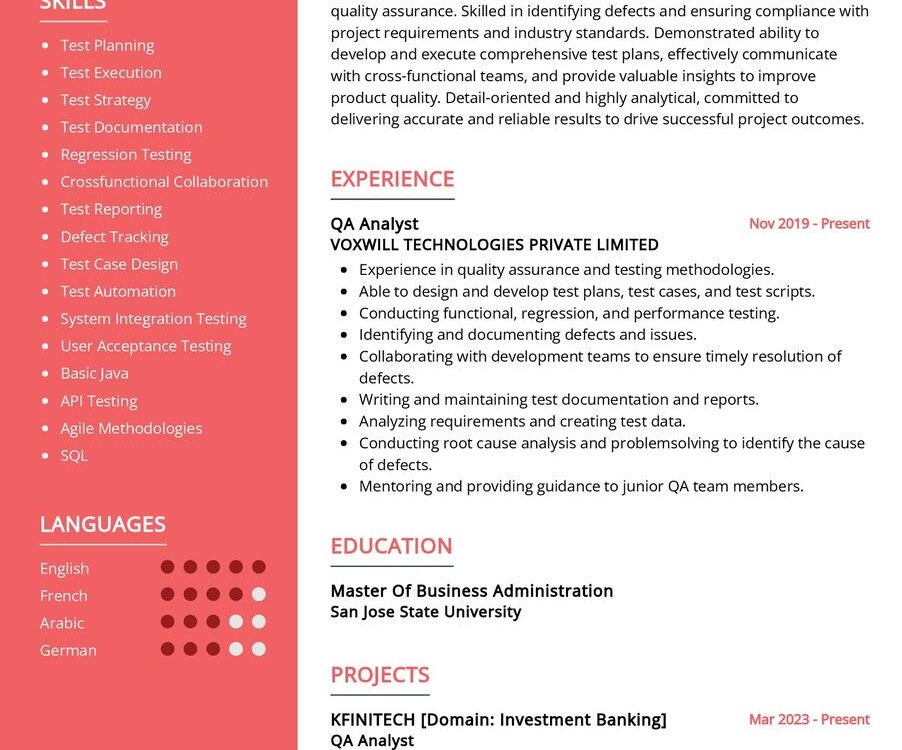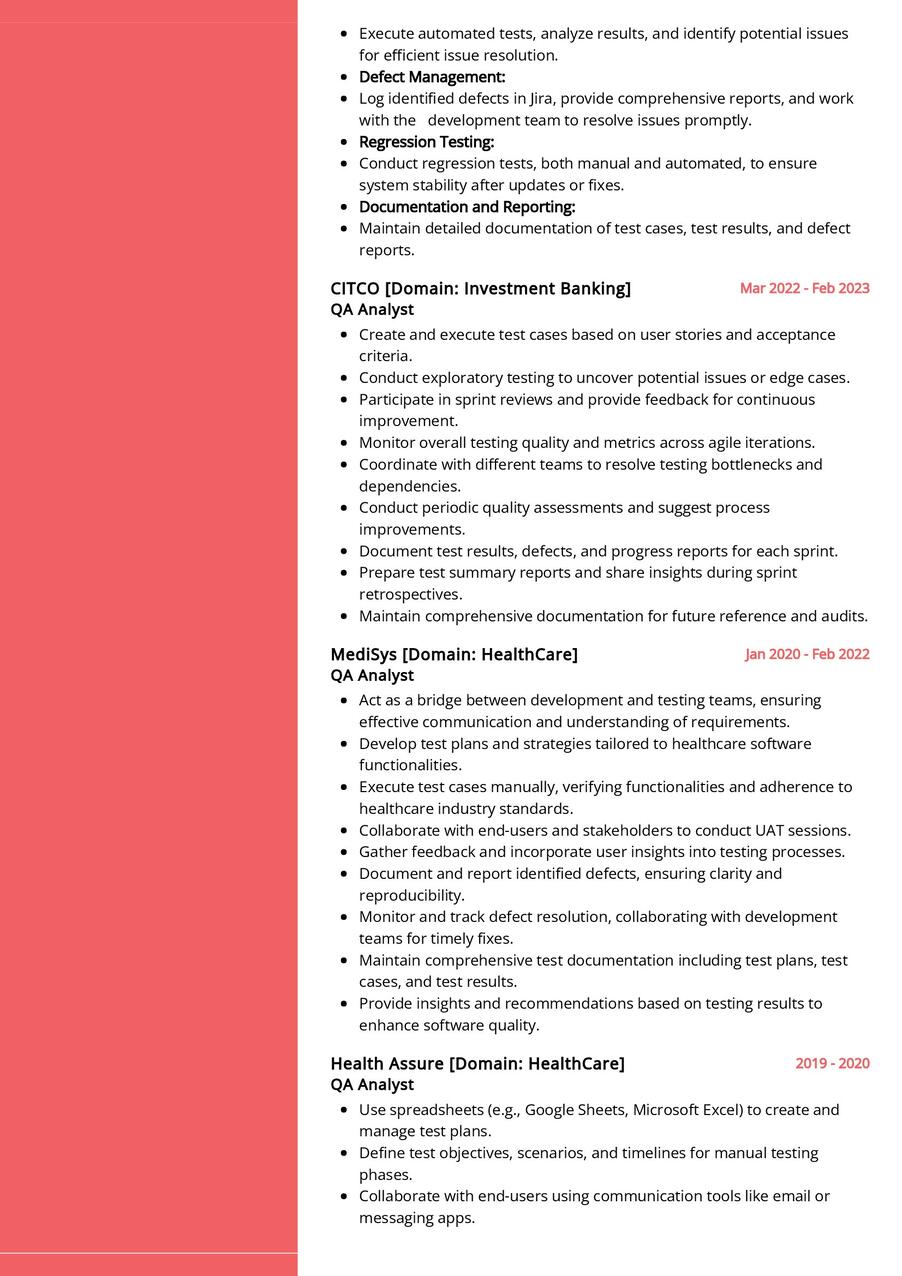Exploring the Role of a QA Analyst
As technology continues to advance, the role of a Quality Assurance (QA) Analyst becomes increasingly crucial in ensuring the seamless functioning of software and applications. The QA Analyst is a linchpin in the software development life cycle, playing a pivotal role in maintaining product quality. Let’s delve deeper into the multifaceted responsibilities and requirements that define the role of a QA Analyst, a position that demands a keen eye for detail and a passion for ensuring excellence in software development.
Understanding the QA Analyst Job Requirements
Embarking on the journey to become a QA Analyst involves meeting specific requirements that form the foundation for success in this role. The path to becoming an effective QA Analyst includes a blend of education, technical skills, and practical experience. Let’s break down the essential requirements:
- A Bachelor’s degree in Computer Science, Information Technology, or a related field, demonstrating a solid foundation in the technical domain.
- Comprehensive knowledge of software testing methodologies, including manual and automated testing.
- Hands-on experience in using testing tools such as Selenium, JIRA, or TestRail.
- Attention to detail and analytical skills, crucial for identifying and documenting defects in software.
- Strong communication skills to collaborate effectively with development teams and stakeholders.
- Familiarity with Agile and Scrum methodologies, as many organizations embrace these frameworks for software development.
- Continuous learning mindset, staying updated on industry trends and advancements in testing methodologies.
Acquiring relevant certifications in software testing, such as ISTQB or Certified Agile Tester, can enhance your profile and demonstrate your commitment to professional development.
Responsibilities of a QA Analyst
The role of a QA Analyst is multifaceted, involving various responsibilities aimed at ensuring the quality and reliability of software products. Let’s explore the key duties that define this role:
- Developing comprehensive test plans and test cases based on project requirements and specifications.
- Executing manual and automated tests to identify software defects and ensure proper functionality.
- Collaborating with developers to understand system architecture and facilitate effective testing.
- Participating in the software development life cycle, providing quality assurance input from the initial design phase to the final release.
- Performing regression testing to ensure that new developments do not adversely impact existing functionality.
- Documenting and tracking defects, providing clear and detailed information to assist developers in the debugging process.
- Contributing to the continuous improvement of testing processes and methodologies within the organization.
Each responsibility is a crucial step in ensuring that the software meets the highest quality standards before reaching end-users.
QA Analyst CV Writing Tips
Crafting a compelling CV is essential for standing out in the competitive job market. Your CV is a reflection of your skills, experience, and dedication to quality assurance. Here are some tips to help you create an impactful QA Analyst CV:
- Highlight specific projects or applications you have tested, emphasizing your contributions to their success.
- Quantify your achievements by including metrics, such as the number of defects identified and resolved, to showcase your impact.
- Showcase your proficiency with testing tools and methodologies, demonstrating your ability to adapt to various testing environments.
- Include any relevant certifications, showcasing your commitment to ongoing professional development.
- Customize your CV for each application, aligning your skills and experience with the specific job requirements.
Your CV is your professional story, and each section should contribute to painting a comprehensive picture of your skills and achievements as a QA Analyst.
QA Analyst CV Summary Examples
Your CV summary is the opening statement that sets the tone for the entire document. It should provide a snapshot of your expertise and what you bring to the table as a QA Analyst. Here are some examples to inspire you:
- “Results-driven QA Analyst with five years of experience in manual and automated testing, adept at identifying and resolving software defects to ensure optimal product quality.”
- “Detail-oriented QA Analyst with a proven track record in executing comprehensive test plans, collaborating with development teams, and contributing to the successful release of high-quality software.”
- “Experienced QA Analyst specializing in Agile methodologies, with a focus on continuous improvement and a passion for delivering flawless software solutions.”
Each summary is an opportunity to make a strong impression, so tailor it to highlight your unique strengths and achievements.
Building an Effective Experience Section for Your QA Analyst CV
The experience section of your CV is the narrative of your career journey, detailing your roles, responsibilities, and accomplishments. Here are some examples to guide you:
- “Led testing efforts for a critical software project, resulting in a 30% reduction in post-release defects and enhancing overall product reliability.”
- “Implemented automated testing processes, increasing testing efficiency by 25% and allowing for more extensive test coverage.”
- “Collaborated with cross-functional teams to implement Agile testing practices, resulting in faster release cycles and improved product quality.”
Each experience entry is a chapter in your QA Analyst story, illustrating your contributions to the success of the projects you’ve been involved in.
Education Section for Your QA Analyst CV
Your educational background is an important aspect of your CV, demonstrating your foundation of knowledge in the field. Here’s how you can present your education:
- Bachelor of Science in Computer Science, XYZ University, where I gained a solid understanding of software development principles, 2015.
- ISTQB Certified Tester Foundation Level, showcasing my commitment to professional development in software testing, 2016.
- Master of Science in Information Technology, ABC University, providing advanced knowledge in testing methodologies, 2018.
Each educational entry is a testament to your dedication to learning and staying abreast of industry advancements.
Essential Skills for Your QA Analyst CV
Your skill set is a toolkit equipped with the abilities you’ve honed over the years. Here are the essential skills that a QA Analyst should possess:
Soft Skills:
- Attention to detail, ensuring thorough testing and identification of software defects.
- Communication skills, facilitating effective collaboration with development teams and stakeholders.
- Analytical thinking, vital for creating comprehensive test plans and identifying potential areas of improvement.
- Adaptability, enabling you to navigate the dynamic landscape of software development and testing.
- Problem-solving abilities, crucial for diagnosing and resolving software defects efficiently.
Hard Skills:
- Proficiency in testing tools like Selenium, JIRA, and TestRail, demonstrating your technical expertise.
- Knowledge of manual and automated testing methodologies, essential for comprehensive software testing.
- Familiarity with Agile and Scrum methodologies, aligning your testing approach with industry best practices.
- Regression testing, ensuring the stability of software products over multiple development cycles.
- Documentation skills, providing clear and detailed defect reports for developers.
Each skill in your toolkit contributes to your ability to ensure the highest quality in software development.
Common Mistakes to Avoid in Your QA Analyst CV
Avoiding common pitfalls in CV writing is crucial to creating a document that truly reflects your capabilities. Let’s explore some mistakes to steer clear of:
- Using generic terms without showcasing your specific contributions to testing projects, resulting in a lack of depth in your CV narrative.
- Omitting quantifiable achievements, missing the opportunity to demonstrate the impact of your testing efforts on project success.
- Underestimating the importance of a well-crafted CV summary, a key element that sets the tone for the entire document.
- Overloading your CV with technical jargon without providing context, potentially alienating non-technical readers.
- Skipping the proofreading process, which can leave a negative impression on potential employers.
Avoiding these mistakes is essential to crafting a CV that stands out and effectively communicates your value as a QA Analyst.
Key Takeaways for Your QA Analyst CV
As we conclude this comprehensive guide, let’s recap the key points to keep in mind while crafting your QA Analyst CV:
- Highlight your specific contributions to testing projects, showcasing the tangible impact of your work.
- Quantify your achievements to provide a clear picture of the results of your testing efforts.
- Showcase your proficiency with testing tools and methodologies, emphasizing your adaptability to different testing environments.
- Customize your CV for each application, aligning your skills and experience with the specific job requirements.
Finally, feel free to utilize resources like AI CV Builder, CV Design, CV Samples, CV Examples, CV Skills, CV Help, CV Synonyms, and Job Responsibilities to create a standout application and prepare for the [QA Analyst] job interview.
Armed with these insights and tips, you are now ready to craft a CV that is a true reflection of your journey, your skills, and your aspirations as a QA Analyst. Best of luck!



